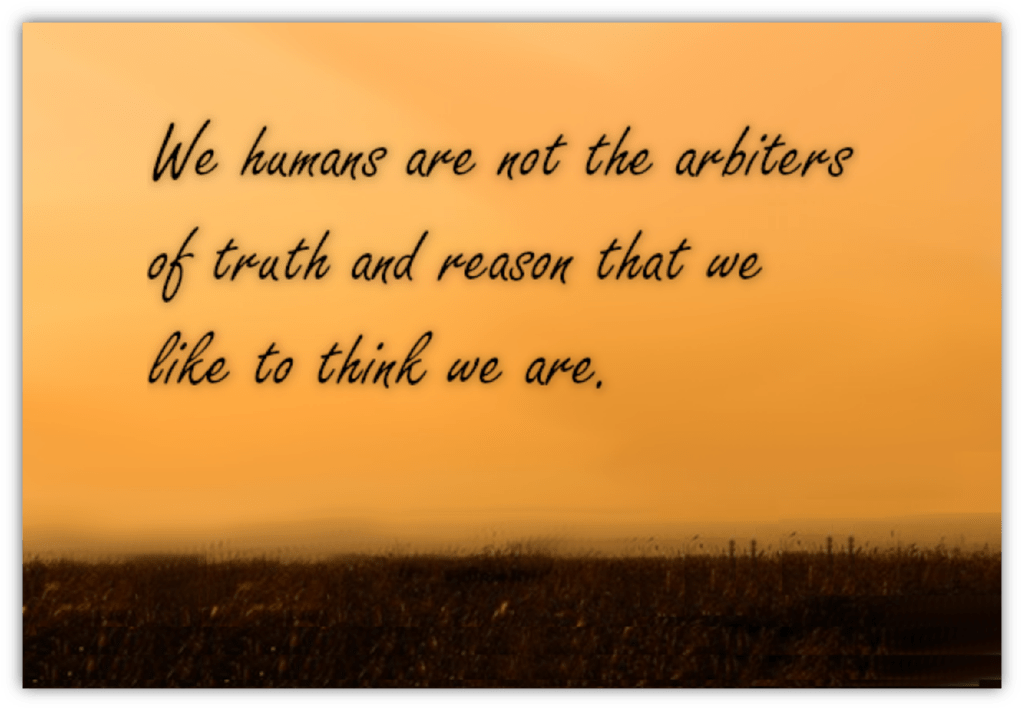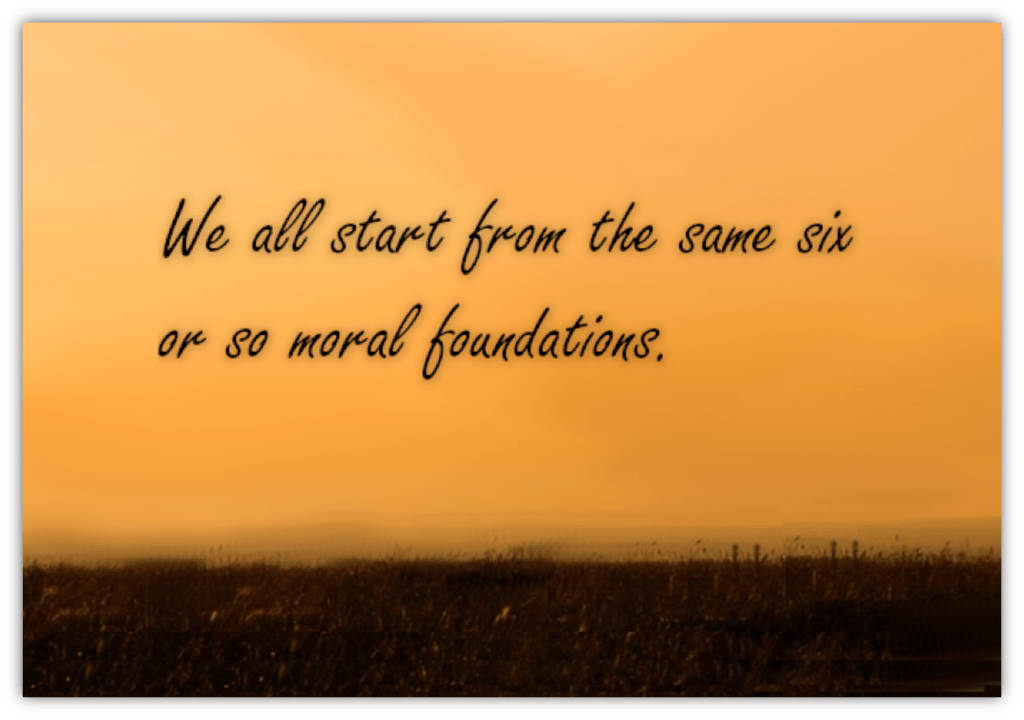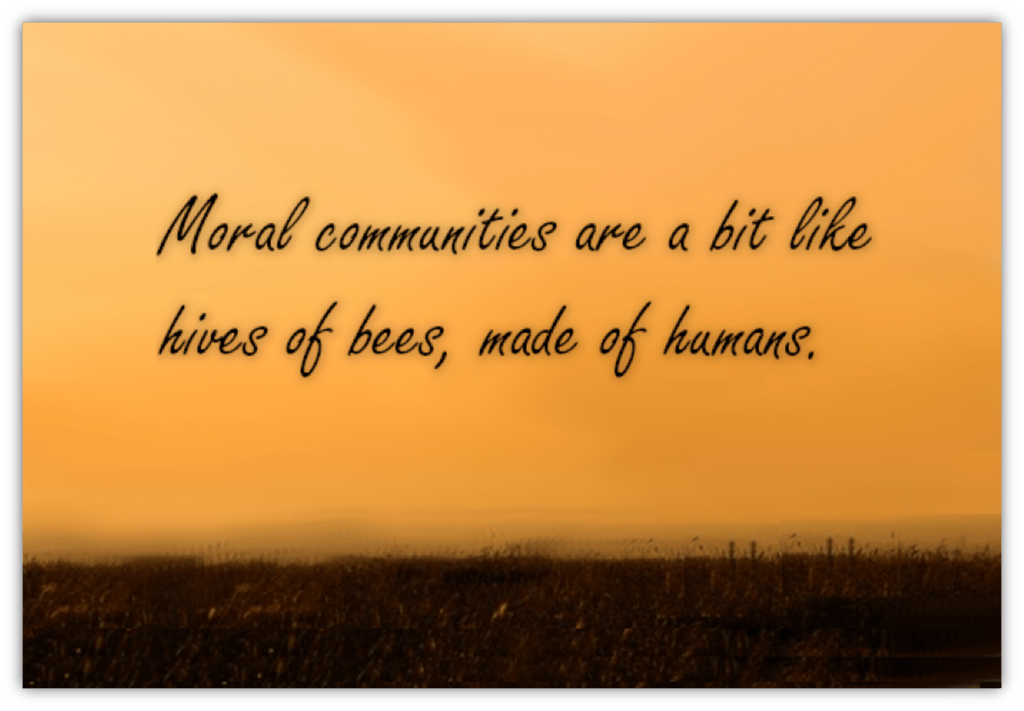The concluding chapter of Jonathan Haidt’s The Righteous Mind doesn’t have a central theme or lesson to it.
Instead, he ties together the three main theories of the book and tries to apply them to the real world of politics and religion.
Haidt states outright that his efforts as a researcher have been to describe human moral psychology as it is. Having dedicated most of his book to that descriptive work, he offers this last part as some small effort to try to help us to apply that psychology to work toward a better world.
First, let’s sum up the basic points of the book:

Part One:
Every individual human uses their reasoning to make sense of the flashes of intuitive judgment that we experience with every new situation and bit of information we encounter.
We rarely have direct control over these intuitions. Instead, our reasoning serves our intuitions to justify what we already did, or argue for what we have already intuited that we want to do.

Part Two:
But each community unites under a distinct moral narrative, and so different communities can prioritize different moral foundations over others. As a result, moral perspectives and priorities can vary wildly across communities.
Generally, the moral foundations of a given society tend to be ranked equally. The important exception, however, are societies that are Western, educated, industrialized, rich, and democratic (WEIRD). Within WEIRD societies, there are often communities that rank Care, Fairness, and Justice over the other foundations. Even within WEIRD societies, though, there are communities that have a broader, thicker approach to morality that is less conducive to life in a secular, liberal, democratic, pluralistic nation.

Part Three:
Shared moral narratives, shared signifiers of speech and appearance, and shared rituals (especially those that elicit collective effervescence or transcendence) help to bind individual humans into a coherent moral super-organism.
The individuals bound together become blinded to alternative moral perspectives, counterfactual evidence, and anything that threatens to compromise the bonds of the collective. This unique tribal hiving nature in humans explains our astounding feats of altruism, as well as our record of atrocities.
Regarding Part One’s problem of individual irrationality, Haidt promotes a corrective that has already proven successful: social institutions that encourage the civil competition of ideas. The scientific community is a great example of this. Individual scientists may be biased toward their own theories, but the system uses professional competition and transparency of methods in order to keep individuals in check, and to encourage rigor by producing results that will survive intense scrutiny.
For all academic enterprises, including scientific ones, Haidt recommends that institutions maintain committed to viewpoint diversity, to keep our righteousness from compromising our rigor. It does seem to be true, however, at least for non-STEM fields, that the viewpoint diversity of universities has been in dramatic decline, with fewer and fewer conservative and even liberal viewpoints present to provide substantive counterarguments.
Everyone can find themselves in a moral bubble – even curious, well-educated types. And knowledge can suffer as a result.

With respect to the six moral foundations, Haidt emphatically acknowledges the importance of Western secular democracy and the somewhat limited moral system of “Care-Fairness-Justice” that’s needed to keep it working. While he took pains to point out that liberal morality is in fact WEIRD, he does make clear that this is the best system we have to handle a morally diverse society.
Still, the weirdness of WEIRD morality should not be forgotten. And in the interest of capturing the hearts and minds of citizens who may not understand that very limited, not-very-tasty moral palate of WEIRD life, the other moral foundations should at very least be considered in the development and promotion of every political or policy issue.
With respect to our various moral hives, Haidt breaks down the various blind spots that define the actions of a hive, to the fury of other hives. He lists some nuggets of wisdom from liberals, libertarians, and conservatives, and each of these can shed light on the blind spots of the other groups. Not unlike rival scientists, these competing hives can actually serve to keep each other in check, leading to smarter and more effective policies.
Of course, that’s only true as long as the rival groups can see each other as distinct teams playing the same game, rather than enemies fighting for the good of the nation. Acknowledging the wisdom of your opponent, something that you had previously been blind to, is perhaps a first step in getting the elephant from a rival team to start to lean your way.
As for me, this section on the wisdom and blind spots of the various hives really opened up my own eyes about my morality versus the morality of more conservative, traditional, and threat-sensitive people.
At very least, we should all think about any political issue as a potential trade-off between different moral considerations. Our blind spots tend to lie in what is being sacrificed in order to enforce what we want. Even if your own moral priorities never change, it’s important to consider the trade-offs that other communities might care about very much.
For instance, as a cosmopolitan liberal, I’m in favor of promoting and celebrating cultural diversity. But, to do so in the absence of any other effort is often at the cost of social cohesion, efficiency, and trust among at least the more threat-sensitive members of a society. Not even racist people in this case, just people who aren’t well-equipped to process unfamiliarity. Why not buttress those efforts in celebrating diversity with other efforts that help to de-emphasize differences and enforce a common identity?

These two initiatives tend to be mutually exclusive due to the mutual blind spots of the cosmopolitan left and the nativist right, but in practice they could be two considerations that are both addressed, albeit in some balance that may shift according to changing needs. Diversity already exists and different perspectives often benefit us. But one perspective that we need to consider is that group cohesion and trust-building should always be a priority as well.
For other issues, there might be a more severe trade-off than this example. But learning to think about, and getting others to think about, such trade-offs is a great first step to communicating across moral divides.
Of course, facts are important too. The book was published in 2012, and Haidt has since published an essay on how recent information fracturing and political polarization has made substantive reconciliation across moral divides a near-insurmountable problem.
At least interpersonally though, the book does offer some ways for readers to try to connect with individual loved ones from across a divide of politics or religion.
As for my own family, I don’t think it will ever work unless I move back to Northeast Philly and visit every week.
Without that regular in-person contact, common practices, and collective effervescence, it’s too hard to fight against the flood of information that strengthens their identity as my moral rival.
But for those of you who are closer in proximity to individuals from a different moral tribe, the lessons of this book provide a great starting point to try to forge a shared moral Matrix with said people, at least a hive that treats different groups like other teams rather than enemies.
Things are even worse now than when Jonathan Haidt wrote this book, and even back then this one book was never going to suffice as the remedy for all of our problems. However, to have any hope in coming up with a solution, it’s first necessary to understand the nature of the problem.

The Righteous Mind is the most authoritative and incisive look into the nature of our problems of moral divides that I have come across yet.
I encourage everyone to give it a chance, peer into your own righteous mind, and maybe we can all start to contemplate workable solutions to bridge our divides and unite people again to the common cause of our WEIRD, precious society.
Let the author know that you appreciated their article with a “heart” upvote!





I wrote this a little while back, and have since revisited The Righteous Mind.
I think Haidt would argue that I undersold the importance of trust-building efforts amidst diversity. We shouldn’t think that such efforts are only for the sake of the most threat-sensitive folks. He points to sociology research (stemming all the way back to its founder Emile Durkheim, but also including recent work) on how diversity contributes to normlessness more generally, and consequently decreases in community engagement and trust, even within people from the same social groups.
People on the left are too eager to assume bigotry when conservatives rail against diversity initiatives, but there are other valid concerns out there that we should pay attention to. In fact, the bigotry may itself be rooted in deeper things such as anxiety about normlessness. That doesn’t excuse the bigotry, but it suggests a possible root cause that, if properly addressed, could help to neutralize such animus.
Just wanted to shoehorn this in:
Many thanks to our friend Phylum for an interesting and stimulating discussion, over the past few weeks.
I can say with certainty that I have learned quite a bit, and have been thinking about the many interesting points that you’ve made over the course of the four articles.
Everyone has enjoyed your series, and we thank you for your time, talent, camaraderie, and writing.
Ashley Parker was here in 2018. She was stationery for about ninety seconds. She looked confused. She was on her phone. It’s possible she was telling the person on the other line: “I can’t tell the difference between the protestors and the counter-protestors.”
It is so weird here.
Or as our wise statesmen from generations ago taught us, “All you need is love.”
We are all unique but also all the same. Find both and embrace both, with love and openness. Hate the sin, not the sinner.
I’ve got more cliches in my holster. They also happen to be true. Don’t need to live a life of irony or cynicism to be original.
Is it true that “the love you make is the love you take?”
In the end, all things being equal…
perhaps.
Botched my homage to Chris Farley.
No, you didn’t!
… it was awesome.
Perhaps there is no greater wisdom than:
“Now, say you’re sorry and hug and be done with it.”
Sage advice! (Just make sure you dispense it more delicately than, say, Phyllis George…)
Now, there’s a throwback.
This Moment Of Cringe brought to you by Aaron3000:
https://www.washingtonpost.com/archive/lifestyle/1985/05/16/invitation-to-a-hug-phyllis-georges-gaffe-with-dotson-38/abd90ef2-c53a-4785-947a-56709e47d0b5/
I hope as a society we will be able to return to some of the activities that COVID interrupted that otherwise brought us together… bowling leagues, concerts, festivals, amusement parks, etc. I’m just starting to re-engage in those, and I really do believe that such interaction helps me and those with whom I interact see each other as people, not just archetypes or stereotypes.
Agreed!
Those socializing activities had been in decline even before the pandemic (see Robert Putnam’s book Bowling Alone), but then things got so much worse. We definitely need all of the community-building and humanizing opportunities we can get!
I’ve always felt that all throughout history, no matter the culture, certain humans thrive being in an active environment – they want to socialize, experience different things, overwhelm whichever senses they choose to; that fulfills them. And if moving from another culture and/or background, there’s better opportunity and less stress to blend in to your new surroundings in a populated settlement.
But there’s a large percentage of people who prefer quiet, and are just as happy in their corner of the world doing their thing, away from what they view as chaos and commotion. Folks cannot come from a city and force rural people to be like they are used to, that’s colonialism basically, and last I checked thats generally thought of as a very bad thing nowadays, lol. That’s what China is doing with the Uigurs. That’s like moving to a nation that is viewed as Old World and demanding they behave like the Western World – no matter how inherently wrong their ways of culture appear. It’s on that society to change from within; it can never, ever be forced, and should never be forced. But that level of respect doesn’t manifest itself often enough.
The Amish understand that! They may live their simple life off the grid on their home farm, but to function as part of the greater society when they take their wares down to the Reading Market in Philly, they operate just like every other storefront, and have their iPhones, etc. One doesn’t have to like how things are in some fragment of society, just respect the locals and go back to living where you personally are happy.
Easier said than done, I know, but in my opinion that’s all it really comes down to.
Yes, I largely agree. Recently, South Park had an episode about the small town being overrun with cosmopolitan liberal families, and their depiction of the liberals as essentially an invasive species–complete with one-word squawks of trendy stuff like “Latte!” or “Yoga!”–was hilarious and trenchant.
It is a little more complicated though. For one, those colonial liberals are typically following economic forces–they go where the jobs are–and the trendy business are simply doing what they think the customers want. Market capitalism is a huge dimension of small “l” liberalism, and yet it can have real negative effects on stuff like community and tradition. That’s something that American conservatives don’t like to admit (and on the flipside: liberals don’t like to admit that there are aspects of market capitalism that they like).
Another thing is that those individuals who crave exploration and interrogation can often feel trapped in a traditional community they’re born into, until or unless they find an opportunity to move away. And yet, even if they do move away, this broad sorting into likeminded enclaves across the nation is a huge part of why we all feel so polarized at the national level, particularly given the omnipresence of social media stories about “those people” (whoever they might be) to rile us up.
There’s no perfect solution, and there will probably always be some kind of tension between different demands and pressures. But at the least, we do need to find ways to enable more in-person interactions with people not like us–in contexts that are more personable and substantial than being tourists or annoying neighbors.
[Nom-nom-nom]
Phylum serving up some excellent food for thought once more! Dude, I could probably talk with you for hours and never get enough. 🙂
Totally agree, no easy answer, but it all begins with all sides being willing to listen and be respectful. Too often, fear clouds the conversation, and that is not an easy obstacle to overcome.
Totally see how sociology and human behavior can be so fascinating for folks to study!
Phylum,
Your comments about liberals remind me of my favorite comic strip of all-time, Bloom County, and in particular Burke Breathed’s May 2, 1982 piece:
https://www.gocomics.com/bloomcounty/1982/05/02
Lol, hey who knows, maybe Trey Parker and Matt Stone were paying tribute to this.
I’d call it an Opus Magnum, but it looks like a shotgun.
Okay, I’ll let myself out…